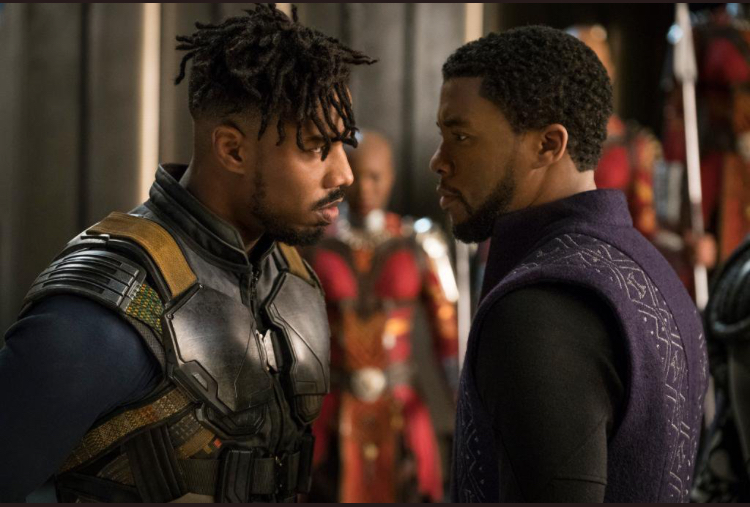Yes, ‘Black Panther’ meets the hype
Courtesy of @theblackpanther on Twitter
Jordan (left) and Boseman (right) both turn in strong performances in “Black Panther.”
February 22, 2018
With all the hoopla that surrounded “Black Panther” preceding its release, I was admittedly anxious towards its premiere. I feared that the latest Marvel flick would do what many have done before it: offer a rash telling of the titular hero’s origins before diving into a predictable conflict with a hackneyed antagonist. I also worried that instead of focusing on the breadth of the standalone story, “Black Panther” would only serve to set up numerous plot points to build up hype for “Infinity War,” the next film in the “Avengers” series.
Like a henchman at the end of the Panther’s claws, my apprehension was ripped to shreds.
Following the events of “Captain America: Civil War,” T’Challa (Chadwick Boseman) returns to the fictitious African nation of Wakanda after his father’s death for his coronation as king, and to inherit the Black Panther moniker. After he’s crowned, T’Challa sets out to capture Ulysses Klaue (Andy Serkis), an arms dealer who had previously stolen a supply of the valuable vibranium metal from Wakanda. With Wakandan military general Okoye (Danai Gurira) and spy/ex-lover Nakia (Lupita Nyong’o) in tow, T’Challa tails Klaue to South Korea as part of another arms deal.
Only when Klaue is apprehended, the film’s true villain is revealed to be Erik Killmonger (Michael B. Jordan), an elite American military operative with a special connection to Wakanda. When Killmonger poses a threat to the security of Wakanda and the entire planet, T’Challa is forced to defend his rule and prevent a global crisis.
What truly makes “Black Panther” special is that T’Challa’s story doesn’t rely on references to other Marvel characters to prop up the Panther among Marvel elite. “Black Panther’s” vibrant setting and characters are actually worthy of their own cinematic universe.
This really starts with Wakanda itself. The fictitious nation portrays itself as a third-world country, but is really the most technologically advanced nation on Earth. Because of its vibranium supply, Wakanda is full of technological marvel and aesthetic beauty. This is reflected both in set pieces and special effects–the lush jungles, harsh mountain ranges and booming cities of Wakanda are filled to the brim with a wide spectrum of colors and sounds. The Black Panther’s modern yet surreal lair would have Batman himself looking to remodel the Batcave. I’m wishing upon a star for Wakanda to be realized as a Disney World exhibit, because its mind-boggling landmarks rival those of special effects trailblazer “Avatar.”
The “Black Panther” cast is also one of Marvel’s strongest for a standalone film. Beyond the main characters previously mentioned, the movie’s supporting cast is equally as vivid. For example, Hollywood vet Forest Whitaker dominates scenes as Wakandan elder Zuri, and Letitia Wright steals the show as Shuri, the quirky yet charming genius sister of T’Challa. Also, Daniel Kaluuya of “Get Out” fame expertly showcases many emotions as W’Kabi, a Wakandan noble conflicted over the future of his country.
That’s not to undermine the efforts of the main cast. Boseman gives it his all as T’Challa, portraying a strong-willed hero who has an aura of grace that few cinematic superheroes have captured (take notes, Ben Affleck’s Batman.) Boseman’s T’Challa is also unafraid to be vulnerable, making him relatable even as king of an immensely powerful country. Serkis also had me squirming in my seat with the unhinged nature of his character, and Nyong’o along with Gurira showcased strong, dynamic female leads.
With “Black Panther,” Marvel has also made a long stride towards solving its “villain problem.” For those unfamiliar with what I just mentioned, let me quiz you with some Marvel trivia. Quick: who was the antagonist in “Ant-Man”? What about in “Guardians of the Galaxy”? Can you even name any bad guys from the “Iron Man” movies? My point is that for so long, Marvel has failed to construct captivating villains to rival their heroes. But that changed with “Black Panther.” Jordan’s Killmonger is vicious and intimidating, but he’s understandable. Albeit, his plans are extreme, but he has a serious motive for his actions rather than simple lust for power. Instead of yawning through his monologues, I was left hanging onto every word. For once, I could almost empathize with a Marvel villain. That alone should be enough to validate “Black Panther” as a top-tier Marvel movie.
However, this is the part of the review where I have to elaborate on some of the movie’s shortcomings. Director Ryan Coogler, you’ve made this extremely difficult, so thanks for that. But I will say that I had trouble hearing some lines especially in the first half of the movie (but I can’t be sure as to attribute this to the movie’s sound mixing, or my rinky-dink local theater.) Also, I felt that some of the fight moves were unnatural, and paced oddly (some maneuvers felt slower than others, but the scenes didn’t deliberately go into slow-motion.) Overall, these nitpicks should in no way detract from the “Black Panther” experience.
“Black Panther” is a triumph due in no small part to its characters and setting. Because of these elements, “Black Panther” is a stellar addition to the Marvel cinematic universe that stands on its own, yet renews excitement for future Marvel installments.

